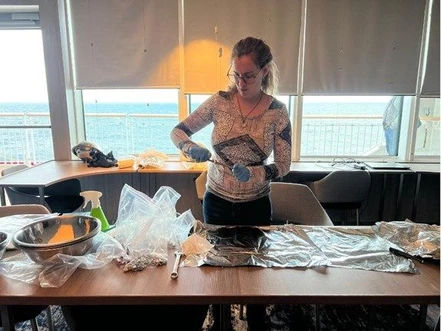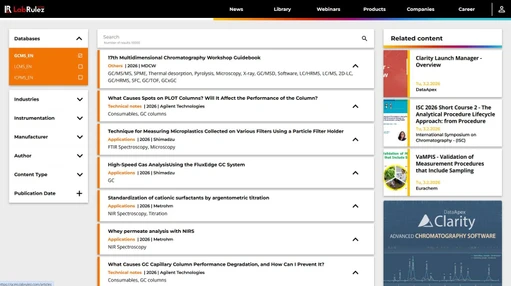Beyond IP 585: A Faster, More Precise Approach to Aviation Fuel FAME Analysis

- Photo: Thermo Fisher Scientific: Beyond IP 585: A Faster, More Precise Approach to Aviation Fuel FAME Analysis
- Video: Chromatography & Mass Spectrometry Solutions: ISQ 7610 Single Quadrupole GC-MS Product Overview
As the aviation industry continues to evolve toward greener solutions with Sustainable Aviation Fuels (SAF), there’s growing interest in bio-derived blends. Accurate analysis of Fatty Acid Methyl Esters (FAMEs) in jet fuel becomes increasingly critical to ensure fuel quality, safety, and regulatory compliance. Advanced GC-MS techniques now enable FAME analysis that will help accelerate jet fuel testing and improve stability over extended testing periods.
 Thermo Fisher Scientific: Beyond IP 585: A Faster, More Precise Approach to Aviation Fuel FAME Analysis.
Thermo Fisher Scientific: Beyond IP 585: A Faster, More Precise Approach to Aviation Fuel FAME Analysis.
The challenge of modern aviation fuel analysis
Analyzing FAMEs helps ensure controlled and intentional blending, rather than accidental contamination. With the current allowable limit for unintentional FAMEs content within jet fuel at 5 mg/kg, laboratories need reliable, efficient methods to ensure aviation safety. Traditional analysis methods have been time-consuming and sometimes challenging to implement, especially when dealing with complex petroleum hydrocarbon matrices.
 Thermo Fisher Scientific: Beyond IP 585: A Faster, More Precise Approach to Aviation Fuel FAME Analysis: Figure 1. (A) Full scan acquisition of 0.7 and 5 mg∙kg-1 FAMEs in kerosene and (B) t-SIM acquisition of FAMEs of 0.7 mg∙kg-1 FAMEs in kerosene.
Thermo Fisher Scientific: Beyond IP 585: A Faster, More Precise Approach to Aviation Fuel FAME Analysis: Figure 1. (A) Full scan acquisition of 0.7 and 5 mg∙kg-1 FAMEs in kerosene and (B) t-SIM acquisition of FAMEs of 0.7 mg∙kg-1 FAMEs in kerosene.
Breakthrough in analysis time and accuracy
IP 585 method is commonly used to test for FAMEs in jet fuel using gas chromatography with flame ionization detection (GC-FID).
Our latest application note demonstrates a significant advancement in FAME analysis by using GC-MS, achieving:
- 20-minute reduction in analysis time compared to standard Method IP 585
- Efficient separation of all targeted compounds in under 24 minutes
- Accurate quantification at trace levels (below 1 mg/kg)
- Exceptional stability over extended testing periods
 Thermo Fisher Scientific: Beyond IP 585: A Faster, More Precise Approach to Aviation Fuel FAME Analysis: Figure 2. Absolute sensitivity robustness with continuous analysis over 7 days. The number of injections (bar graphs) represents the total number of injections from the start of the analysis (day 1).
Thermo Fisher Scientific: Beyond IP 585: A Faster, More Precise Approach to Aviation Fuel FAME Analysis: Figure 2. Absolute sensitivity robustness with continuous analysis over 7 days. The number of injections (bar graphs) represents the total number of injections from the start of the analysis (day 1).
Key benefits for your laboratory:
- Enhanced efficiency: Faster analysis times mean higher sample throughput
- Superior accuracy: Precise quantification across both low and high concentration ranges
- Robust performance: Stable response over multiple injection sequences
- Regulatory compliance: Meets and exceeds current industry standards
- Reduced maintenance: Extended uptime with minimal source maintenance
This innovative approach to FAME analysis represents a significant step forward in fuel quality control, offering laboratories the tools they need to meet increasing demands for faster, more accurate results while maintaining the highest safety standards in aviation fuel testing.
Learn how this revolutionary approach can enhance your laboratory’s capabilities and efficiency in jet fuel analysis. The comprehensive application note includes detailed method parameters, validation data, and complete system specifications.
Download the full application note, Stay ahead in developing green energy solutions: Fatty acid methyl ester (FAME) analysis for jet fuel using gas chromatography-mass spectrometry, to discover how you can implement this advanced FAME analysis method in your laboratory.
Visit us on LinkedIn: #GCMS #FAME #Aviation #GasChromatography
Adam Ladak
Adam Ladak is the global product marketing manager for GC quadrupole mass spectrometry at Thermo Fisher, based in the UK. He started his career working in a contracting testing lab analyzing sports supplements and horse feed for prohibited substances. He has over 20 years of experience in the analytical testing industry and has worked for leading instrument manufacturers in various roles from an application specialist to a global marketing role focused on food and environmental testing. Adam is passionate about utilizing our GCMS instrumentation to meet the customer needs and solve real world problems.




